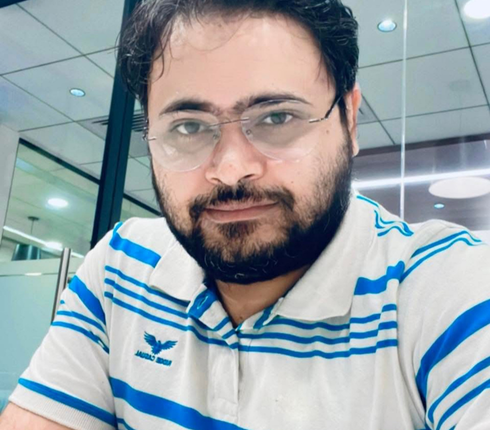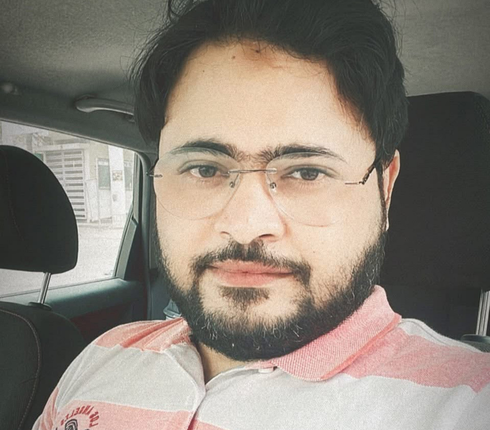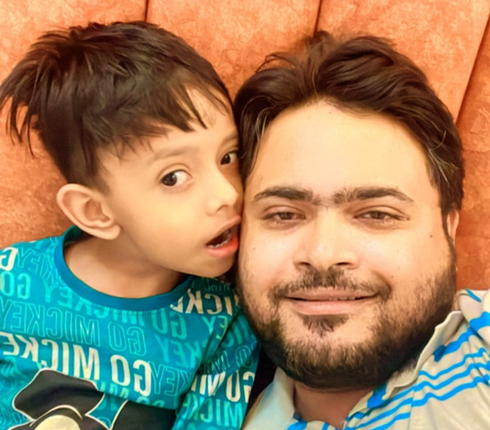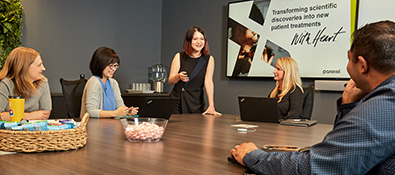Meet Shadaab Ayub, a Principal Medical Writer working in India.
Knowing that my work can touch lives—even if it’s behind the scenes—is what motivates me every day

Meet Shadaab Ayub: Transforming Medical Data into Patient Impact
At the intersection of science and communication, Shadaab Ayub serves as a Medical Writer at Parexel India. Driven to make a difference in healthcare, he transforms complex clinical data into accessible information that influences treatment decisions. His days combine focused writing with teamwork as he creates reports that bridge scientific discovery and practical application. With a talent for simplifying complexity, Shadaab finds fulfillment knowing his work contributes to advancing medical treatments. His journey at Parexel reflects excellence with heart—approaching each document as a vital link connecting innovative research to patients who need it most.
Why did you choose the Clinical Research industry?
I chose to work in clinical research because I wanted to be part of something meaningful. It’s not just about working with numbers or writing reports—it’s about helping people. Every clinical trial we support could lead to a new treatment that gives hope to patients. We help doctors and healthcare teams by giving them accurate, science-based information they can trust. And we play a role in improving public health by making sure new medicines are safe and effective. Knowing that my work can touch lives—even if it’s behind the scenes—is what motivates me every day
What does a day in the life of a Principal Medical Writer look like?
My day as a medical writer is a mix of quiet writing time and busy teamwork. I usually start with a cup of coffee and check my emails and deadlines. Then I get into writing—this could be a report, reviewing project timelines, or slides for a presentation. I spend a lot of time turning complicated medical data into clear, easy-to-understand content. I look through research papers, trial results, and guidelines to make sure everything is correct. In the afternoon, I usually have meetings with medical experts, reviewers, or other writers to talk through the data and make sure we are all on the same page. There is always something new to learn, which keeps things interesting. By the end of the day, I’m finishing up edits, checking references, and getting ready for the next round of work.What part of being a Medical Writer are you most passionate about?
One part of my job that I really enjoy is turning complex medical data into something that actually makes sense to patients. It is kind of like solving a puzzle—taking all the technical info from clinical trials or research papers and shaping it into a clear, accurate story that others can understand and use. I love that I get to learn something new almost every day, whether it is about a new treatment, a disease area, or a scientific breakthrough. And honestly, it feels great knowing that my work helps doctors, researchers, and even patients make more informed decisions. That is what keeps me excited about what I do!
What skills are needed to be successful within your team?
To do well in our team as a medical writer, you need to be good at:
- Writing clearly and making sure everything is accurate.
- Being organized really helps too, especially when you are working on more than one project at a time.
- Understanding complex data. You should be okay with reading scientific papers and working with data from clinical trials.
- Good communication is also super important because we often talk with medical monitors, biostatisticians, project leads, reviewers, and other writers to make sure everything makes sense.
- Being receptive. It is also great if you are open to feedback and always ready to learn new things.
We are a friendly and supportive team, and we all help each other do our best.
What have you experienced at Parexel but not anywhere else?
One thing that really stands out for me at Parexel is the level of respect and support across the team. No matter your role or experience level, your voice is heard and your input is valued. That kind of environment makes it so much easier to grow and learn. I have had the chance to work closely with experts from different backgrounds, and everyone is always open to sharing knowledge and helping each other out. It is not just about getting the job done, it is about learning together and lifting each other up. That kind of culture is something I had not experienced anywhere else, and it is made a big difference in how confident and motivated I feel in my role.

How do you work "With Heart TM" and what does it mean to you?
For me, working "With Heart TM" means genuinely caring about the impact of what I do. As a Medical Writer, I am not just putting words on a page, but I am helping communicate important scientific information that can affect patients’ lives. I try to bring that sense of purpose into everything I write, whether it is regulatory documents or any other safety documents. It also means being kind and respectful to my teammates, supporting each other, and always being open to learning. When you care about the work and the people around you, it shows—and that is what "With Heart TM" means to me.
How has Parexel supported your career growth?
Parexel has really helped me grow by giving me the chance to work on a wide variety of documents.
When I first joined, I was mostly familiar with a safety documents, but over time, I have been able to learn and work on things like:
- Clinical Study Reports (CSRs)
- Informed Consent Forms (ICFs)
- Investigators Brochures (IBs)
- Regulatory submissions.
The team is super supportive—there’s always someone willing to guide you or share tips. Plus, the training sessions and resources they offer make it easier to pick up new skills and understand different document types. It is been a great learning journey, and I feel like I am constantly expanding my knowledge and confidence as a medical writer.
Has there been a time where you've overcome a challenge within your job and what did you learn from it?
Definitely! One challenge I faced early on was working on a type of document I had never handled before. It felt a bit overwhelming at first—lots of new terms, structure, and expectations. But with the support of my team and some great training resources at Parexel, I was able to get the hang of it.
- I asked questions
- I took notes
- I built my confidence
What I learned from that experience is that it is okay not to know everything right away. Being open to learning, asking for help, and staying curious really helped me grow. Now, I actually enjoy working on those kinds of documents!
Has there been a project you've worked on that has been rewarding and how?
One of the most rewarding projects I worked on was for a COVID-19 drug that got FDA approval. I helped write the safety reports and submission documents, which was a big learning experience. The timelines were tight, but it felt amazing to know our work helped bring a new treatment to patients. It really showed me how important every detail is in this kind of work—and reminded me why I love doing what I do.
How does Parexel and your line-manager support flexibility and work-life balance?
Honestly, the flexibility at Parexel has been a huge plus for me. My line manager and team really understand that we all have lives outside of work, and they trust us to manage our time. Whether it’s adjusting my hours for personal appointments or just needing a quiet day to focus, there is a lot of support and understanding. We are encouraged to speak up if we are feeling overwhelmed, and there is always someone willing to help out or shift things around if needed. It makes a big difference knowing that work-life balance is actually respected here, not just talked about.
How do you and your team take quality seriously?
Quality is a big deal for us, and we take it seriously in everything we do. Whether it’s writing a report or reviewing a document, we always double-check the data, follow the right guidelines, and make sure the message is clear and accurate. We also rely on each other—peer reviews, Quality Control (QC) checks, and team discussions help us catch any issues early. Everyone is focused on doing things right the first time, but we are also open to feedback and learning from mistakes. It’s all about making sure our work is solid and supports the bigger goal of helping patients.
How does your role contribute to any, or all, of the Parexel behaviors?
- Commit to excellence
- Win as one team
- Deliver "With Heart" and determination
- Own the outcome
In my role as a medical writer, I feel like I contribute to all of Parexel’s core behaviors in some way. I commit to excellence by making sure every document I write is clear, accurate, and follows the right guidelines—quality really matters. I win as one team by working closely with colleagues from different departments; we support each other and share knowledge to get the job done. I definitely try to deliver “With Heart” by keeping the patient in mind and caring about the impact of our work. And when it comes to owning the outcome, I take full responsibility for my tasks and always aim to meet deadlines and deliverables. It’s a team effort, but we each play a part in making it all come together.
What do you want candidates to know about your role before accepting an offer?
If you are thinking about joining as a medical writer, just know that it’s a mix of:
- technical knowledge,
- writing and
- teamwork
You will spend a lot of time reading clinical data, writing different types of documents, and making sure everything is clear, correct, and follows the rules. Some days can be fast-paced, especially when deadlines are tight, but you will learn a lot along the way. The good news is—you are never alone. The team is super helpful, and there is always someone to guide you if you are stuck.
If you enjoy writing, like learning new things, and want to do work that helps people, this role is a great fit. Just be ready to stay curious, ask questions, and grow every day!
Personal Insights
What do you enjoy outside of work?
Outside of work, my 6-year-old son pretty much runs the show! Most of my free time is spent playing, running around, building things with blocks, or getting schooled in board games by him. It’s non-stop energy, but honestly, it’s the best kind of busy. He keeps me on my toes and reminds me to enjoy the little moments. It’s my daily dose of fun, laughter, and a bit of chaos—in the best way possible! 😊

Explore Parexel
-
 Learn More
Learn MoreOur work culture
Learn about our culture, perks, learning opportunities, and our corporate responsibility approach. Parexel's compassionate and results-driven work culture prioritizes patient care and employee growth.
-
 Learn More
Learn MoreMeet Ruchika, a Principal Medical Writer for Safety Medical Writing
Ruchika has been with Parexel for over 17 years. She joined in 2007 after college, starting with case safety reports. Over a decade, she progressed through various pharmacovigilance roles. Now a senior medical writer and safety scientist, Ruchika has developed a comprehensive understanding of patient safety throughout her career.
-
 Learn More
Learn MoreWhat is a Clinical Research Organization?
A Clinical Research Organization (CRO) is a company contracted by a pharmaceutical, biological or medical device manufacturer to manage clinical research studies and other services to support product development. Learn about the four phases and the key functions of clinical trials.
Featured Jobs
Sign up for our Talent Community
Sign up and we’ll reach out with job alerts when positions that match your career interests become available. We’ll also share periodic updates about the latest company news and events.

